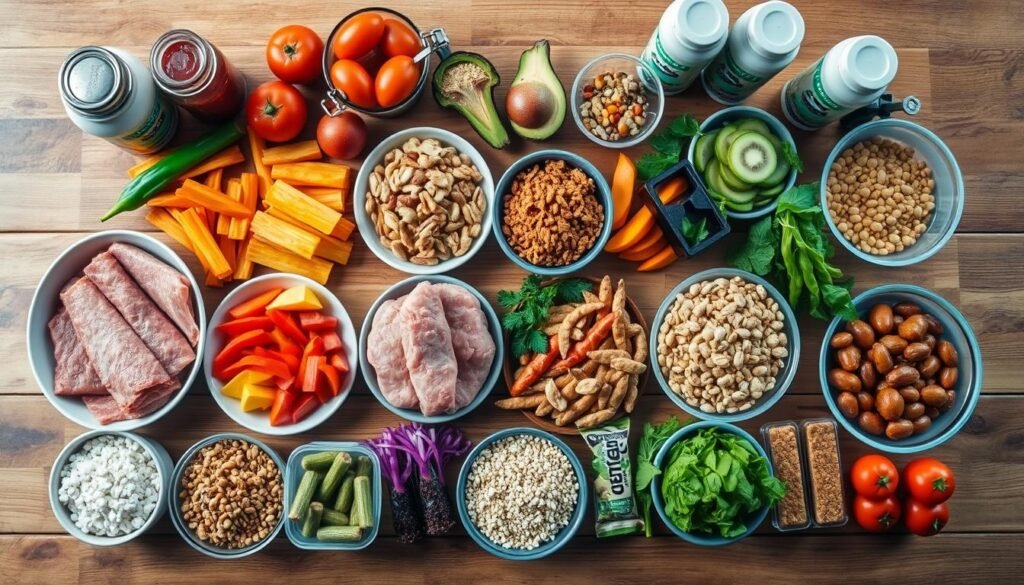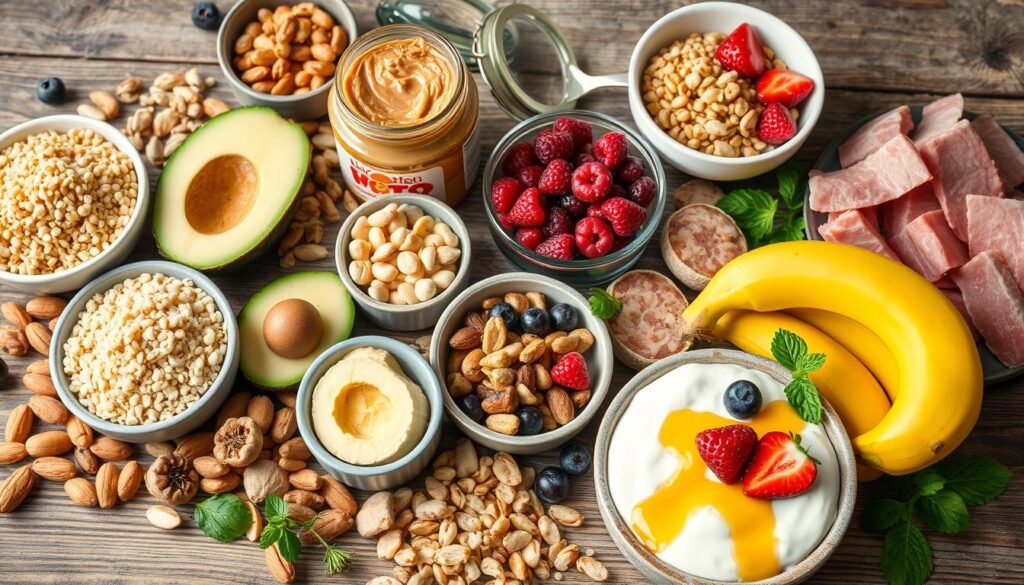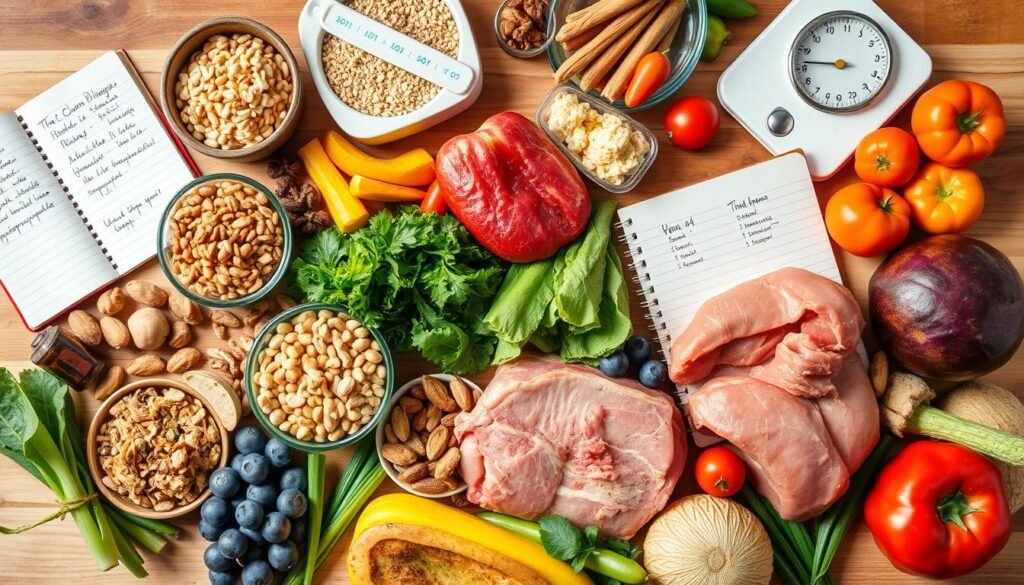Do you find it hard to gain muscle even with intense workouts? The key to gaining muscle might actually be in your diet. The Bulking Diet 101 is designed to help you understand the importance of eating right for muscle growth.
Eating more calories is vital for gaining muscle, especially when you’re also lifting weights. In this article, you’ll learn how to plan meals that help you meet your fitness goals.
Nutrition plays a huge role in how well you perform and recover when you’re bulking. Let’s look at the tips and tricks for a successful bulking diet.
Key Takeaways
- Understanding the relationship between calorie surplus and muscle growth.
- How to create an effective bulking meal plan.
- Importance of nutrient-dense foods in a muscle-building diet.
- Identifying the right macronutrient ratios for optimal results.
- Avoiding common pitfalls during the bulking process.
Understanding the Basics of a Bulking Diet
A bulking diet is key for those wanting to gain muscle mass. It’s different from other diets because you eat more calories than you burn. This extra energy helps muscles grow and recover.
The focus of a building muscle diet is on macronutrients: proteins, carbs, and fats. Each plays a big role in working out and muscle repair. Foods high in protein like chicken, fish, and beans are crucial. Carbs from whole grains and fruits give you energy to exercise.
For beginners, knowing how many calories to eat is important. Keeping track helps you find out your maintenance calories. This makes it easier to eat the right amount more. Your meal plan should include foods that are full of nutrients.
Understanding these basics helps people make better dietary choices. This way, they can reach their muscle-building goals more effectively.
What is Bulking and Why is it Important?
Bulking is about eating more to grow your muscles. It’s not just about eating lots. You need the right balance of more food and hard workouts. This way, bulking helps your muscles develop better.
When you bulk up, your body adjusts in ways that help muscles grow. Eating more calories helps muscles get bigger. And having enough protein is key for fixing and building muscles. Together, they boost your performance, which is key for athletes and bodybuilders.
Bulking isn’t just physical. It’s also mental. Keeping a good mindset is important. You should set clear goals, enjoy your small wins, and focus on getting better step by step. This keeps you going strong on your bulking journey.
To wrap up, understanding bulking is the first step for anyone wanting to grow their muscles. It’s a path that improves your body and mind. By doing this, you become stronger in every way.
Bulking Diet 101: Key Principles for Muscle Growth
Starting a bulking diet means learning key principles. It’s all about the right mix of macronutrients. Proteins, carbs, and fats are vital for growing muscles and staying healthy.
Eat foods rich in nutrients. They give you the vitamins and minerals your body needs to recover and perform well. Aim for lean proteins, whole grains, healthy fats, and lots of fruits and veggies.
Stick to a regular eating schedule to build more muscle. Eating at consistent times keeps your energy up and aids muscle recovery. Also, eating right before and after working out boosts your results.
Add strength training into your plan for better results. It makes sure the extra calories go to your muscles, not fat.
| Macronutrient | Importance | Best Sources |
|---|---|---|
| Protein | Essential for muscle repair and growth | Chicken, fish, eggs, legumes |
| Carbohydrates | Provides energy for workouts | Brown rice, quinoa, oats, potatoes |
| Fats | Supports hormone production and overall health | Nuts, avocados, olive oil, seeds |
Knowing these bulking basics and choosing the right foods is key. This creates the perfect setting for muscle growth.
How to Create an Effective Bulking Meal Plan
To start an effective bulking meal plan, you need a few easy steps. First, it’s crucial to find out how many calories you need. Most people should eat 250 to 500 more calories each day. Online calculators can estimate your daily caloric needs based on your lifestyle and personal details.
Then, it’s key to work out your macronutrient (macros) ratios. A good rule is to have 40-60% of your calories from carbs, 25-35% from proteins, and 15-25% from fats. This mix helps your muscles grow and keeps your energy up.

Choosing a variety of healthy foods makes your meals tasty and full. Here are some tips for a bulking diet:
- Protein sources: Go for lean meats like chicken and beef, eggs, and quality protein powders.
- Carbohydrates: Pick whole grains such as brown rice and oatmeal.
- Healthy fats: Avocados, nuts, and olive oil are great for adding calories.
For a varied diet, here are some meal ideas:
- Breakfast: Whole grain toast with avocado and poached eggs.
- Lunch: Grilled chicken and a quinoa salad with veggies.
- Dinner: Baked salmon with sweet potatoes and broccoli.
With careful planning and diverse foods, following a bulking meal plan is easy. This method helps muscle growth. It also makes bulking up fun and doable over time.
Best Foods for Bulking: Nutrient-Dense Options
When you want to gain muscle, it’s essential to choose the right foods. A good list for bulking includes foods packed with nutrients and calories. These foods help with muscle growth and keep you healthy.
Picking different kinds of food ensures you get all the nutrients you need. Consider these important food groups:
| Category | Best Foods | Nutritional Benefits |
|---|---|---|
| Proteins | Chicken, Beef, Eggs | Rich in amino acids essential for muscle repair and growth. |
| Carbohydrates | Brown Rice, Oats, Quinoa | Provide energy and fiber, aiding in digestion and sustained energy levels. |
| Healthy Fats | Avocados, Nuts, Olive Oil | Support hormone production and nutrient absorption while providing caloric density. |
Eating a variety of nutrient-dense foods is key. This helps keep meals interesting. Change up your diet by combining different food types. This way, you enjoy your meals and get the vitamins and minerals needed for muscle growth.
To start bulking, aim for around 3000 calories daily and adjust as needed. Make sure those calories are from the right foods to see the best results.
For tips on bulking diets, check out this resource. It can give you more information on how to eat for muscle gain.
High-Calorie Foods for Bulking: Fuel Your Gains
If you’re serious about building muscle, knowing which high-calorie foods to eat is key. Adding these foods to a bulking diet helps meet calorie needs and boosts nutrition. Pick calorie-dense foods to give you energy for workouts and recovery.
Top high-calorie foods for bulking include:
- Nut Butter: Almond and peanut butter are tasty, high in calories and healthy fats. They’re great on smoothies or toast.
- Dried Fruits: Raisins, dates, and apricots are sweet, caloric, and portable snacks. They fit well in meal plans.
- Whole-Fat Dairy: Milk, yogurt, and cheese offer many calories and important fats and proteins for muscle growth.
- Oils: Adding olive or coconut oil to your food easily ups your calorie intake without making the meal bigger.
- Granola: It’s packed with carbs and fats, good with yogurt or as a snack.
To successfully bulk up, blend these high-calorie foods into your daily meals. Here’s some easy bulking diet tips:
- Eat a high-calorie breakfast. Try oats with nut butter and fruit.
- Snack on calorie-rich foods like a nut and dried fruit trail mix.
- Add calorie-dense toppings to your meals. Use olive oil, seeds, and cheese.
- Make smoothies with protein powder, fruits, and nut butter for quick calories.
- Focus your meals on calorie-rich bases like potatoes, quinoa, or rice with protein.
Using high-calorie foods right helps make balanced meals that create a caloric surplus. This is vital for muscle growth. It’s possible to meet calorie targets without harming your health.

| Food Item | Calories Per Serving | Benefits |
|---|---|---|
| Peanut Butter | 190 | High in healthy fats and protein |
| Dried Apricots | 100 | Rich in vitamins and antioxidants |
| Whole-Fat Yogurt | 150 | Source of probiotics and calcium |
| Olive Oil | 120 | Supports heart health and high in antioxidants |
| Trail Mix | 200 | Energy-dense snack packed with nutrients |
Bulking Macros: Understanding Macronutrient Ratios
Understanding macronutrients is key for anyone beginning a bulking diet. A well-planned diet makes a big difference in muscle growth and body shape. It’s important to balance protein, carbohydrates, and fats for success.
For muscle growth, protein is very important. It’s suggested to take 1.6 to 2.2 grams of protein per kilogram of body weight. This helps with muscle repair and growth. Carbohydrates should be 45-60% of your diet. They are the main energy source for workouts.
Fats are also crucial, making up 20-35% of daily calories. Healthy fats, like those from avocados and nuts, help with hormone production. Depending on your goals, you might adjust these ratios.
The table below shows typical ratios for bulking:
| Macronutrient | Recommended Percentage | Primary Sources |
|---|---|---|
| Protein | 25-30% | Chicken, beef, fish, legumes, dairy |
| Carbohydrates | 45-60% | Rice, pasta, bread, fruits, vegetables |
| Fats | 20-35% | Nuts, seeds, oils, avocados |
Don’t forget about micronutrients and water. Vitamins and minerals support your metabolism and overall health. Water is key for many body functions, including muscle growth.
If you want to learn more, many resources explain macronutrients. Understanding them can make adjusting your diet easier. This leads to better muscle growth. For a detailed bulking diet guide, check this nutrition guide.
Bulking Diet Tips for Beginners
Starting a bulking journey means learning key diet tips for success. For newbies, being patient and consistent is key. Gaining muscle mass takes time, effort, and dedication. Keeping track of both weight and strength gains helps keep you motivated.
It’s important to listen to your body’s hunger signals for a successful diet. Eat when you’re hungry, not just by the clock. Planning meals in advance helps avoid unhealthy choices. Meal prepping saves time and ensures you’re getting enough calories.
Logging food intake can be tough for beginners. A food diary can help track what you eat every day. This helps with managing portion sizes and reaching calorie goals. Eating high-calorie, nutrient-rich foods helps bulk up without feeling too full.
Celebrate your small achievements to keep spirits high. It could be a slight strength gain or sticking to your meal plan. Recognizing these wins builds confidence. Below is a summary of key bulking diet tips for beginners:
| Tip | Details |
|---|---|
| Track Progress | Record strength gains and changes in weight to monitor progress effectively. |
| Plan Meals | Prepare meals ahead of time to avoid unhealthy choices and ensure caloric goals are met. |
| Listen to Your Body | Recognize hunger cues and eat when hungry instead of adhering strictly to a schedule. |
| Food Diary | Keep a record of daily intake to help with portion control and adjustments. |
| Celebrate Small Wins | Acknowledge minor achievements to maintain motivation throughout the bulking process. |

Common Mistakes to Avoid on a Bulking Diet
A bulking diet can help you gain muscle. Yet, some common mistakes can slow you down. Understanding and avoiding these pitfalls can boost your gains while keeping you healthy.
It’s easy to eat too much junk food. High-calorie foods are important, but bad choices can lead to unhealthy weight gain. A good muscle-building diet includes lots of nutrient-rich foods. This ensures you get enough vitamins and minerals.
Another mistake is not eating enough vitamins and minerals. These are vital for muscle repair and your health. Your meals should have plenty of fruits, veggies, and whole grains. This helps you avoid bulking diet mistakes.
Some people underestimate the power of exercise. Working out is key for building muscle and keeping a healthy metabolism. The best bulking diet tips suggest mixing good nutrition with regular training. This approach leads to better results.
In conclusion, if you’re on a bulking diet, make smart food choices. Don’t forget about vitamins and minerals, and stick to your workout routine. This helps you steer clear of these common mistakes.
| Mistake | Description | Solution |
|---|---|---|
| Overindulgence in Unhealthy Foods | Consuming too many calorie-dense but nutritionally poor items. | Include more nutrient-dense foods in the diet. |
| Neglecting Micronutrients | Ignoring the importance of vitamins and minerals. | Ensure a variety of fruits and vegetables are included. |
| Disregarding Physical Activity | Failing to engage in regular exercise. | Combine diet with a consistent workout plan. |
Conclusion
In wrapping up our dive into Bulking Diet 101, it’s clear that a good bulking diet is key for muscle growth. It helps you reach your fitness targets. The article shared some essential nutritional tips highlighting the need for eating more calories, choosing the right macros, and sticking to a good workout plan. By using these tips, you can get the best results from your bulking phase.
Every person has different needs and goals. So, it’s important to find a bulking plan that works for you. You might pick lean bulking or a faster approach. But make sure your food choices help you grow muscle while you keep a healthy lifestyle. For more tips on a good bulking plan, check out the essential nutritional tips again. This will boost your knowledge and help you make smart choices.
Success in bulking isn’t just about gaining weight. It’s also about enjoying the journey and building good eating habits. Love the process, stick to your nutrition goals, and be ready to change things up if needed. These steps will lead to a successful bulking journey.